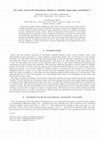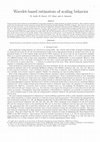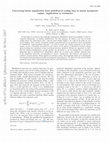Papers by Jean-françois Muzy
Physical Review E, 2015
In this work we investigate the generic properties of a stochastic linear model in the regime of ... more In this work we investigate the generic properties of a stochastic linear model in the regime of high dimensionality. We consider in particular the vector autoregressive (VAR) model and the multivariate Hawkes process. We analyze both deterministic and random versions of these models, showing the existence of a stable phase and an unstable phase. We find that along the transition region separating the two regimes the correlations of the process decay slowly, and we characterize the conditions under which these slow correlations are expected to become power laws. We check our findings with numerical simulations showing remarkable agreement with our predictions. We finally argue that real systems with a strong degree of self-interaction are naturally characterized by this type of slow relaxation of the correlations.
Multifractal analysis of multiplicative random cascades is revisited within the framework of {\em... more Multifractal analysis of multiplicative random cascades is revisited within the framework of {\em mixed asymptotics}. In this new framework, statistics are estimated over a sample which size increases as the resolution scale (or the sampling period) becomes finer. This allows one to continuously interpolate between the situation where one studies a single cascade sample at arbitrary fine scales and where
Journal of Applied Probability, 2012
We present the construction of a continuous-time stochastic process which has moments that satisf... more We present the construction of a continuous-time stochastic process which has moments that satisfy an exact scaling relation, including odd-order moments. It is based on a natural extension of the multifractal random walk construction described in Bacry and Muzy (2003). This allows us to propose a continuous-time model for the price of a financial asset that reflects most major stylized
Lecture Notes in Physics, 2003
Kolmogorovs pioneering work on turbulence is at the heart of most modern concepts and models prop... more Kolmogorovs pioneering work on turbulence is at the heart of most modern concepts and models proposed to account for the so called intermittency phenomenon, where quiet periods are interrupted by intense bursts of activity. Recent findings in empirical finance suggest that these concepts, and more precisely the framework of multiplicative cascades, might be relevant to model the main statistical features
New Economic Windows, 2011
By studying all the trades and best bids/asks of ultra high frequency snapshots recorded from the... more By studying all the trades and best bids/asks of ultra high frequency snapshots recorded from the order books of a basket of 10 futures assets, we bring qualitative empirical evidence that the impact of a single trade depends on the intertrade time lags. We find that when the trading rate becomes faster, the return variance per trade or the impact, as measured by the price variation in the direction of the trade, strongly increases. We provide evidence that these properties persist at coarser time scales. We also show that the spread value is an increasing function of the activity. This suggests that order books are more likely empty when the trading rate is high.
2011 IEEE International Conference on Acoustics, Speech and Signal Processing (ICASSP), 2011
ABSTRACT Hawkes processes are used for modeling tick-by-tick varia-tions of a single or of a pair... more ABSTRACT Hawkes processes are used for modeling tick-by-tick varia-tions of a single or of a pair of asset prices. For each asset, two counting processes (with stochastic intensities) are associated respectively with the positive and negative jumps of the price. We show that, ...
Physical Review E, 2002
We define a large class of continuous time multifractal random measures and processes with arbitr... more We define a large class of continuous time multifractal random measures and processes with arbitrary log-infinitely divisible exact or asymptotic scaling law. These processes generalize within a unified framework both the recently defined log-normal Multifractal Random Walk (MRW) [1, 2] and the log-Poisson "product of cynlindrical pulses" . Our construction is based on some "continuous stochastic multiplication" from coarse to fine scales that can be seen as a continuous interpolation of discrete multiplicative cascades. We prove the stochastic convergence of the defined processes and study their main statistical properties. The question of genericity (universality) of limit multifractal processes is addressed within this new framework. We finally provide some methods for numerical simulations and discuss some specific examples.
Quantitative Finance, 2014
Physical Review Letters, 2010
We study various hourly surface layer wind series recorded at different sites in the Netherlands ... more We study various hourly surface layer wind series recorded at different sites in the Netherlands by the "Royal Netherlands Meteorological Institute." By reporting all velocity magnitude correlation coefficients, associated with the available couples of locations, as a function of their spatial distance, we find that they fall on a single curve. This curve turns out to be remarkably well described by a logarithmic shape, characteristic of continuous cascades with an intermittency coefficient λ2 ≃ 0.04 and an integral scale L ≃ 600 km. Along the same line, we study the scaling properties of spatial velocity increment structure functions. This allows one to estimate the ζ(q) spectrum and to confirm an intermittent nature of mesoscale fluctuations similar to the one observed in fully developed turbulence.

Physica A: Statistical Mechanics and its Applications, 2006
We discuss a possible scenario explaining in what respect the observed fat tails of asset returns... more We discuss a possible scenario explaining in what respect the observed fat tails of asset returns or volatility fluctuations can be related to volatility long-range correlations. Our approach is based on recently introduced multifractal models for asset returns that account for the volatility correlations through a multiplicative random cascade. Within the framework of these models, it can be shown that the sample size required for a correct estimation of the behavior of extreme return fluctuations is generally huge and outside the range of accessible size of data. Consequently, in many cases, the extreme tail probability appears as a power-law, with a rather small (underestimated) tail exponent. We point out that increasing the amount of data by using smaller and smaller (intraday) scales, does not contribute to reduce the bias and, as observed empirically, the tail exponent turns out to be rather stable across scales. * Electronic address: emmanuel.bacry@polytechnique.fr † Electronic address: alexey@cmapx.polytechnique.fr ‡ Electronic address: muzy@univ-corse.fr
Journal of Economic Dynamics and Control, 2008
In this paper, we make a short overview of continuous cascade models recently introduced to model... more In this paper, we make a short overview of continuous cascade models recently introduced to model asset return fluctuations. We show that these models account in a very parcimonious manner for most of "stylized facts" of financial time series. We review in more details the simplest of such models namely the log-normal Multifractal Random Walk. It can simply be considered as a stochastic volatility model where the (log-) volatility memory has a peculiar "logarithmic" shape. This model possesses some appealing stability properties with respect to time aggregation. We describe how one can estimate it using a GMM method and we present some applications to volatility and VaR forecasting. * Electronic address: emmanuel.bacry@polytechnique.fr † Electronic address: alexey@cmapx.polytechnique.fr ‡ Electronic address: muzy@univ-corse.fr

IEEE Transactions on Information Theory, 2002
Various wavelet-based estimators of self-similarity or long-range dependence scaling exponent are... more Various wavelet-based estimators of self-similarity or long-range dependence scaling exponent are studied extensively. These estimators mainly include the (bi)orthogonal wavelet estimators and the Wavelet Transform Modulus Maxima (WTMM) estimator. This study focuses both on short and long time-series. In the framework of Fractional Auto-Regressive Integrated Moving Average (FARIMA) processes, we advocate the use of approximately adapted wavelet estimators. For these "ideal" processes, the scaling behavior actually extends down to the smallest scale, i.e., the sampling period of the time series, if an adapted decomposition is used. But in practical situations, there generally exists a cut-off scale below which the scaling behavior no longer holds. We test the robustness of the set of wavelet-based estimators with respect to that cut-off scale as well as to the specific density of the underlying law of the process. In all situations the WTMM estimator is shown to be the best or among the best estimators in terms of the mean square error. We also compare the wavelet estimators with the Detrended Fluctuation Analysis (DFA) estimator which was recently proved to be among the best estimators which are not wavelet-based estimators. The WTMM estimator turns out to be a very competitive estimator which can be further generalized to characterize multiscaling behavior.

EPL (Europhysics Letters), 2008
In this paper we revisit an idea originally proposed by Mandelbrot about the possibility to obser... more In this paper we revisit an idea originally proposed by Mandelbrot about the possibility to observe "negative dimensions" in random multifractals. For that purpose, we define a new way to study scaling where the observation scale τ and the total sample length L are respectively going to zero and to infinity. This "mixed" asymptotic regime is parametrized by an exponent χ that corresponds to Mandelbrot "supersampling exponent". In order to study the scaling exponents in the mixed regime, we use a formalism introduced in the context of the physics of disordered systems relying upon traveling wave solutions of some non-linear iteration equation. Within our approach, we show that for random multiplicative cascade models, the parameter χ can be interpreted as a negative dimension and, as anticipated by Mandelbrot, allows one to uncover the "hidden" negative part of the singularity spectrum, corresponding to "latent" singularities. We illustrate our purpose on synthetic cascade models. When applied to turbulence data, this formalism allows us to distinguish two popular phenomenological models of dissipation intermittency: We show that the mixed scaling exponents agree with a log-normal model and not with log-Poisson statistics.

The Annals of Applied Probability, 2010
Multifractal analysis of multiplicative random cascades is revisited within the framework of mixe... more Multifractal analysis of multiplicative random cascades is revisited within the framework of mixed asymptotics. In this new framework, statistics are estimated over a sample which size increases as the resolution scale (or the sampling period) becomes finer. This allows one to continuously interpolate between the situation where one studies a single cascade sample at arbitrary fine scales and where at fixed scale, the sample length (number of cascades realizations) becomes infinite. We show that scaling exponents of "mixed" partitions functions i.e., the estimator of the cumulant generating function of the cascade generator distribution, depends on some "mixed asymptotic" exponent χ respectively above and beyond two critical value p − χ and p + χ . We study the convergence properties of partition functions in mixed asymtotics regime and establish a central limit theorem. These results are shown to remain valid within a general wavelet analysis framework. Their interpretation in terms of Besov frontier are discussed. Moreover, within the mixed asymptotic framework, we establish a "box-counting" multifractal formalism that can be seen as a rigorous formulation of Mandelbrot's negative dimension theory. Numerical illustrations of our purpose on specific examples are also provided.
Arxiv preprint cond-mat/ …, 2005
This is a short review in honor of B. Mandelbrot's 80st birthday, to appear in Wilmott magaz... more This is a short review in honor of B. Mandelbrot's 80st birthday, to appear in Wilmott magazine. We discuss how multiplicative cascades and related multifractal ideas might be relevant to model the main statistical features of financial time series, in particular the intermit-tent, ...
Recently, Ghashghaie et al. have shown that some statistical aspects of fully developed turbulenc... more Recently, Ghashghaie et al. have shown that some statistical aspects of fully developed turbulence and exchange rate fluctuations exhibit striking similarities [1]. The authors then suggested that the two problems might be deeply connected, and speculated on the existence of an 'information cascade' which would play the role in finance of the well known Kolmogorov energy cascade in turbulence [2].
… of the International Conference Wavelets and …, 1992
... Conditional entropy coding and perceptual vector quantization for multiresolution imagecompre... more ... Conditional entropy coding and perceptual vector quantization for multiresolution imagecompression B. Macq, S ... A multiscale statistical model using a priori information for estimating signal-to-noise ... Application to a Hubble Space Telescope image 5. Roques, K. Bouyoucef, L ...










Uploads
Papers by Jean-françois Muzy